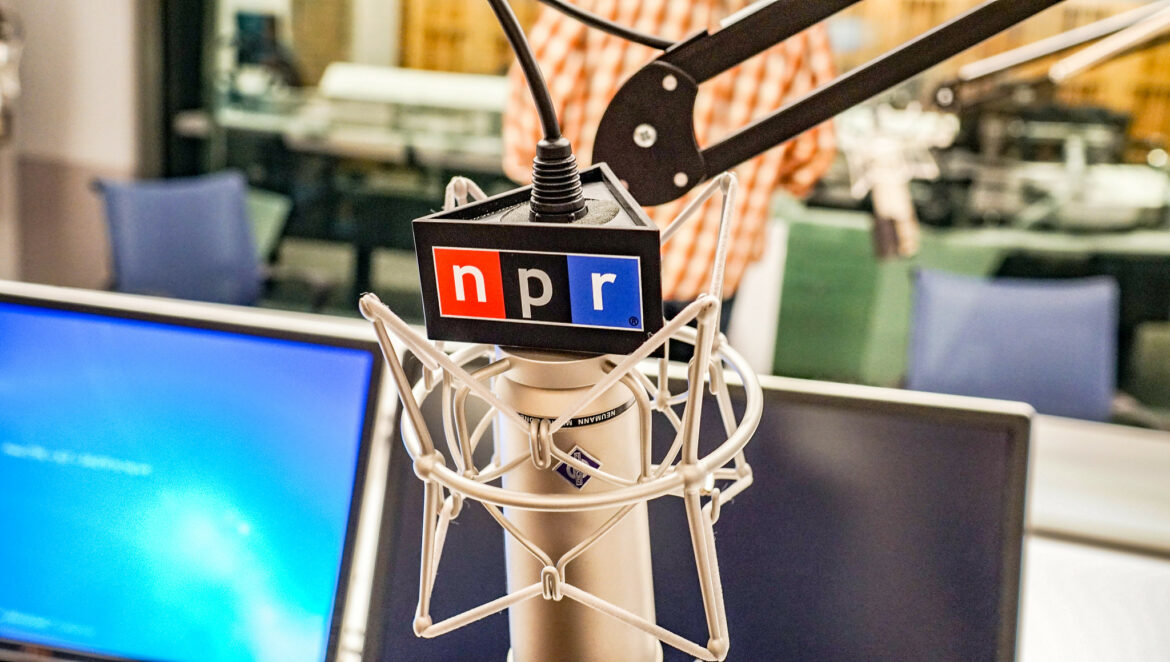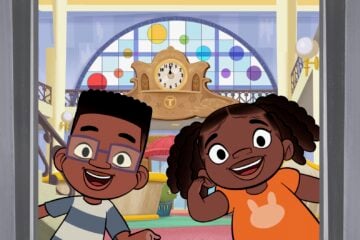NPR updates newsmag strategy to address audience declines

Ted Eytan / Flickr via Creative Commons
NPR has begun making strategic changes to its newsmagazines in an attempt to reverse a trend in audience loss.
Among the changes it’s making on its flagship programs Morning Edition and All Things Considered are including more stories in the 2- to 3-minute range, featuring a broader range of topics and shifting to a livelier and more conversational presentation style.
“[W]hat we’re hearing loud and clear from our broadcast audience is they want a broader mix of shorter and livelier stories, that are personally relevant, and delivered with an approachable conversational style,” Edith Chapin, SVP, editor-in-chief and acting CCO, said in an email to staff last month obtained by Current. She noted that the shows will include fewer scripted two-ways — interviews between a host and a reporter — and that each hour of Morning Edition and ATC will feature no more than one element longer than five minutes.
“The change is not going to dramatically reduce the overall number but it’s making us focus critically and ask: ‘does this earn every minute?’” Eric Marrapodi, VP for news programming, told Current in an email.
More than two-thirds of NPR’s broadcast audience is over 45, but only the over-65 portion has seen growth in the last five years, Chapin said. So NPR has begun “actively targeting” the 40–64 age group with these changes.
“Among people who listen to the radio, this is where we think we can have the most positive impact — it’s a sizable audience that we need to better serve,” Chapin wrote.
While NPR is focused on broadcast audiences, the network will also “address tactics for podcasts and digital in the months ahead, and our approach there will also be targeted to serve the audiences who use each platform,” Chapin wrote.
NPR is also embedding Holly Morris, who works on NPR’s training team and writes the NPR News Quiz, into its newsroom through the end of the year to “help us ratchet up our ‘joy’ quotient across platforms,” wrote Eva Rodriguez, VP and executive editor, in an email to staff obtained by Current. “Think of Holly as our Joy Czar.” “Joy” and “wonder” were among the areas NPR’s audience wanted to see more of, along with personal finance, space and science, and health and wellness, Chapin said. (Bloomberg first reported on Rodriguez’s and Chapin’s emails.)

The emphasis on these areas won’t cut into political coverage, Marrapodi said in an interview.
“We have lots of resources assigned to covering politics and covering the election,” he said. “That’s a huge story. I think we’re well-resourced there. But the audience is telling us that’s not the only thing they want to hear about. … We’re being really cognizant to make sure we’re hitting the politics in an appropriate way to give the audience what they need to know. And also giving them other things that give that surprise, that joy, that delight, that wonder that they’ve come to expect from NPR.”
NPR learned through research that its audience sees it as “a little too formal or a little too academic,” Marrapodi said.
“Sometimes in news, we can fall into being very buttoned-up, especially when we’re covering serious topics,” Marrapodi said. “And the audience expects that from us, to be serious, but I think they’re giving us some permission to experiment a little more and to be a little more casual in those spaces.”
With the changes, NPR is attempting to bolster average-quarter hour listening, which measures average listening within 15-minute intervals. It decided to focus on AQH instead of cume because “cumulative audience is a hard thing to control,” Marrapodi said.
“I always like to tell my teams, ‘Control what you can control,’” he said. “You’re not always going to be able to control when somebody tunes in, but you have a better shot at keeping them listening longer. And that’s something you can control by how lively your broadcast is, how interesting, how personally relevant it is.”
The changes coincide with the fall ratings book, which began earlier this month, Marrapodi said.
Limiting segments over five minutes to only one per hour is one way he thinks NPR can bolster AQH. Before the change, stories and interviews that ran longer than five minutes amounted to about 25% of the newsmagazines’ content, he said, and multiple longer pieces often appeared within a single hour. “Being intentional and spreading them out” could help with listening, he said.
NPR saw annual declines in its weekly broadcast audience from 2017 to 2022, according to a Pew Research report released last year. The total decline was about 22%, according to Pew.
However, the network saw an “encouraging bump” in its most recent audience data in August, according to spokesperson Isabel Lara. The data shows “a big increase in audience” for newsmags and on digital and podcasts “thanks to the recent news cycle,” she said.
“We saw big losses in AQH and in cume, as lots of people did, and we said … the audience is telling us we can’t keep doing what we’re doing,” Marrapodi said. “It’s not working for them, and we’ve got to make some changes.”
“Are we going to do this forever? I don’t know,” he said. “We need to see how the audience responds, and we need to be nimble and flexible.”
Station reactions
Station PDs that Current reached out to generally reacted positively to the changes.
Ron Jones, PD of KCUR in Kansas City, Mo., said he applauds “the new direction” and looks forward to seeing “where it takes us.”
“While both Morning Edition and ATC have been the drivers of the public radio audience for more than 40+ years, their style and format have not changed as much as listener behavior has evolved,” he said in an email to Current. “During the pandemic I realized that it’s time for new thinking and execution without compromising the commitment to quality journalism.”
At WAMC in Albany, N.Y., PD Tina Renick called the changes “a good move” but cautioned against ignoring other audience segments.
“I don’t think they should forget about their ‘future audience,’” she said in an email. “Maybe the younger crowd grew up with more ways to consume audio and are not listening as much, or at all, to radio, but we have to hang on to the hope they will come to know and admire the simplicity of radio.”
NPR’s focus on targeting the 40–64 age group is “welcome,” as it “aligns more closely with the demographics of our local audience,” said Doug Nadvornick, PD at Spokane Public Radio in Washington, in an email.
“I also welcome any attempt to reduce NPR’s heavy emphasis on wonky political process and ‘insider’ coverage that gets so tiresome day after day,” he added.
NPR’s Marrapodi also highlighted the need to utilize station reporters more, which he thinks can help with the effort to liven up broadcasts.
“We’ve got people on the ground, and we need to be demonstrating that and showing their expertise and showing them where they are so the audience has a better understanding of that,” he said. “That’s a real distinction point for our coverage and our journalism.”
Conversations with stations have also spurred more “granular” changes on the newsmagazines over the last year and a half, Marrapodi said. For instance, national hosts have been forward-promoting within segments to try to hold the audience to the end of the segment and pass them to local hosts, he said.
Tactics like that “have been something we’ve really worked hard on with the stations, and they’re not shy about telling you when we’re getting it right and when we need to do better,” he said.
Correction: An earlier version of this article incorrectly said that Chapin wrote the email about Morris. Rodriguez wrote the email.






An interesting if discouraging shift. I stopped listening to local NPR stations years ago due to a few key factors. The brevity of stories. Time spent on topics often barely scratched the surface and then it was on to the next perfunctory item or an ad that isn’t an ad but is indeed an ad, or request for donation proximate to fund drives stretching the meaning of proximate. It was just constant and when it constantly cuts into scant news delivery minutes, what’s even the point. I bailed. Tldr: too little meat. So now it sounds like NPR is leaning into that. Another aspect of newscasts that vexed me was regurgitation of political sugarwater. Maybe the metrics being received were that it got more listeners, or existing listeners to listen more, but even a glance at daily regional, national, global news out of other outlets showed a distinct disinterest in a diversity of stories that wasn’t somehow attributable to the reds and blues. The infrequent branch out from the norm was then lost on me. Obsession with Trump further disincentivized tuning in. Couldn’t go a day, a morning, an afternoon without alerts and analyses and omgs. People on the inside might consider that being informative but it’s unhealthy. Obsession is indeed apt. There are other things. But I guess nothing as juicy. Which put me off permanently.
Way too late with your niggling modifications. Anyone who might have cared is already long gone. When NPR was still relevant it was staffed with journalists, not activists.
Unfortunately, I think NPR is missing the mark in a big way and it really depresses me. Americans are starved for factual, unbiased news. They don’t want more “happy talk” – they can tune into network morning talk shows for that. I personally started noticing more personal chatter between the M.E. hosts this summer – laughing about their kids’ playlist on family vacations, or how little sleep they get – in short it’s about THEM. It’s eye-rollingly horrible. It sounds like they’re trying to be morning hosts at a Top 40 commercial station. Give me the news, report it more thoroughly, and provide a safe harbor from the rest of the news outlets that are focused on pop culture and “click bait” stories. I want to count on NPR for fully vetted, strong journalism content. NPR is missing an opportunity to truly be the brand that’s not a “cult of personality” but a “cult of responsible, factual journalism” where the on-air talent isn’t yucking it up with each other. Thankfully, other nonprofit journalism sites are popping up all over the country. I’m inclined to go support them now. If NPR continues to go down the path of “Magidized” TV stations from the 80’s and 90’s, they should not expect to get any of the millions of dollars of grant money that is available through Press Forward or other entities for nonprofit news producers. Oh, and while I’m ranting, please, NPR – please – start working on your election night coverage plan now. I was on the west coast on a recent election night and the NPR hosts were talking about how “late” it was for them, when it was only 8pm on the west coast. Remember – you cover more than just inside the beltway. And finally, I’m rooting for you NPR, I really am. But you’re about to lose me.
I actually listened regularly 20 years ago to NPR, read the Washington Post daily ect. As long as they believe “fairness is overrated” as Lester Holt famously stated nothing can really change.
“More joy” suggests less coverage of a world in turmoil. The news should not bring joy. Understanding, maybe, but not joy.
Gosh – people want more news like they can get on the TV programs already? With news anchors giggling together? Short little snips of news, repeated all day? That’s why I listen to NPR radio – so I don’t have to have “joy” woven into sobering news. I don’t want to be entertained – I want to learn about what’s going on. And if it takes 15 minutes to educate me, I want you to do that. I was taking a tour of CapitalPublicRadio in Sacramento last week (thanks, CapRadio!) and that’s when I heard about the “15 minute listener”. Are those the people giving money, or is it those of us who want fair, unbiased news with some depth and are willing to make good sized donations? Are you trying to get new listeners and hope those of us who have been listening for years just hang around to hear a little joy? I hope NPR news shows can be everything to everybody because so far, it seems like each change alienates at least some of the listeners. I stopped increasing my donation when CapRadio dropped Splendid Table and On the Media and I was just about to increase my donation due to the great tour I had of the station and now, with this, I may just sit tight for a while longer, to see if this gets any worse. What about using a survey that we’re all invited to respond to? I’m a little tired of hearing that “we’ve heard from our listeners that they want a change” – and no one has asked me. Ask us all at once. Regularly.
As already stated by others, the changes do not resonate with me as being necessary or wanted.
Rearranging the deck chairs on the Titanic.
Everyone knows what the problem is, but no one is willing to be intellectually honest about it. NPR stopped being an unbiased source of news and now weaves a specific political narrative into its coverage of virtually every topic — not just politics, but art, science, and culture.
Half the audience has given up.
NPR will continue to try tiny fixes like “more joy” while pushing for a “diverse” audience that will never come. The result: NPR will be narrowcasting to a left-wing audience fed exactly what they demand.
If NPR is simply trying for a younger demographic, that ship has long sailed. Why alienate the people who have supported it for years?
I know of one station recently that gave up an exclusive regional niche as a classical music station to embrace more NPR programming, because that would help alleviate the news vacuum left by a dwindling local press. They did this despite an outcry from longtime donors. Hope the added “joy” isn’t something you can already get from reading what’s left of the ad-driven and private equity controlled local press which steers clear of controversy or depth.
NPR – and every local station should go the other direction. Provide greater depth/length/perspectives. Take as long as a story requires to tell it well. This is the moment to be contrarian to the TicTok culture and provide an actual service to the audience.
A huge swing and a miss, this contrived joy and enthusiasm schtick. What it projects most is contrived inauthenticity. It’s the polar opposite of genuine. Sober, measured, authoritative delivery was one of the things that kept me turning to NPR over these decades, when the rest of the mediasphere was hurtling towards infotainment and the hokey affect of ribald drive-time radio jocks.
We don’t want goofy patter and lame jokes.
We don’t want GMA.
And we certainly DO want to be informed.
So. Give it to us straight, for goodness sake. If we wanted “colorful” and “animated” chirpy faux banter, we’d seek out programming for toddlers.